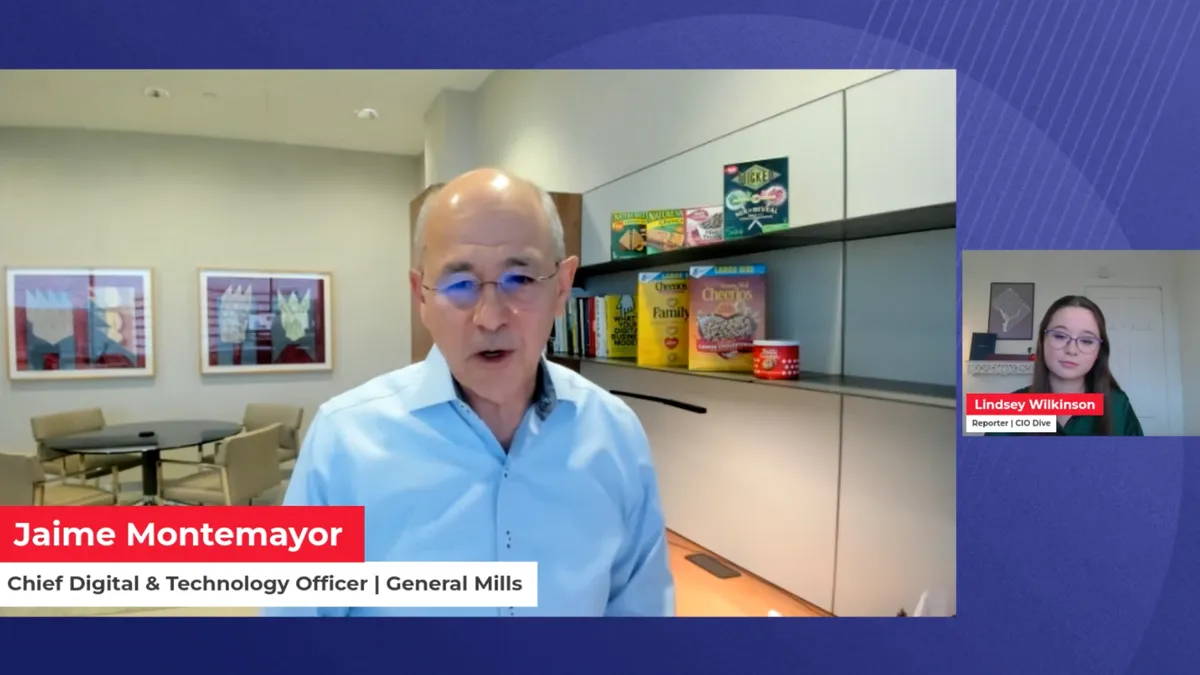Editor’s note: This article draws on insights from an Oct. 30 CIO Dive and CFO Dive live virtual event. You can watch the sessions on-demand.
Generative AI emerged as a seemingly accessible technology for enterprises.
Executives quickly grasped the potential for improving efficiency and upgrading customer experience through the deployment of chatbots, document summarization tools and digital assistants for everything from call centers to engineering teams.
But in the last several years, the technology proved deceptively difficult to scale at the enterprise level, as nagging concerns about AI bias, model hallucinations and data privacy hindered broad adoptions.
“Deploying generative AI comes with some risk for any company that wants to use it,” Jaime Montemayor, chief digital and technology officer at General Mills, said during a Wednesday CIO Dive and CFO Dive live virtual event.
General Mills was nonetheless well positioned for early adoption and rolled out an internal generative AI chatbot called MillsChat in February.
The food industry giant wasn’t focused on large language models when it started to lay the digital groundwork for AI technologies. The company began putting infrastructure in place to support machine learning several years before OpenAI delivered the first ChatGPT iteration in November 2022, according to Montemayor, who was tapped to lead digital transformation at General Mills in February 2020.
As part of the preparations, the company migrated its data to cloud for better analytics capabilities after partnering with Google Cloud three years ago. General Mills had also experienced success with scaling ML capabilities.
“We built dozens of those capabilities across the company,” Montemayor said. “We have deployed them across every function of the organization — marketing, sales, supply chain — and we're generating business value through those.”
Cross-functional value
C-suite buy-in on digital transformation efforts, from cloud and data modernization to AI adoption, helps align IT initiatives with business goals. Building relationships across different company units can help sustain projects once they are in motion.
“It takes a village to be successful with AI in any corporation,” Montemayor said. “One of the first things that we did, a few weeks after ChatGPT was launched, was to put together a cross-functional subgroup of our senior leadership team.”
The executive team included heads of HR, legal, finance and supply chain at General Mills.
As companies advance pilots to full implementation and costs start piling up, it’s particularly helpful to have finance on board. In addition to approving funds, finance executives can help IT identify metrics for returns on technology investments.
“The finance team is the one that is helping us keep the score,” Montemayor said. With support from the finance team, the company gains clarity on where to accelerate or cut back on investments or new capabilities.
The MillsChat assistant is primarily a writing and summarization tool. It was built using Google’s PaLM 2 model and distributed to roughly 900 users earlier this year. Currently, the tool is in the hands of 20,000 General Mills employees, according to Montemayor.
The company’s generative AI wins were the result of workforce improvements as well as technology investments.
“We were a traditional company when we started this journey and we knew that we had to make investments, particularly in data science,” Montemayor said. “Slowly but surely, over the last four years, we've been building our talent foundation to enable our AI program.”
One of the keys for Montemayor is measuring a technology’s capabilities against business priorities. He also stressed the importance of pragmatism when it comes to emerging technologies.
“I'm spending a lot of my time working with my peers in ensuring that, as we experiment and we continue increasing the pipeline of initiatives in the core AI machine learning or generative AI space, we have a good balance between what's possible and what's truly achievable.”












